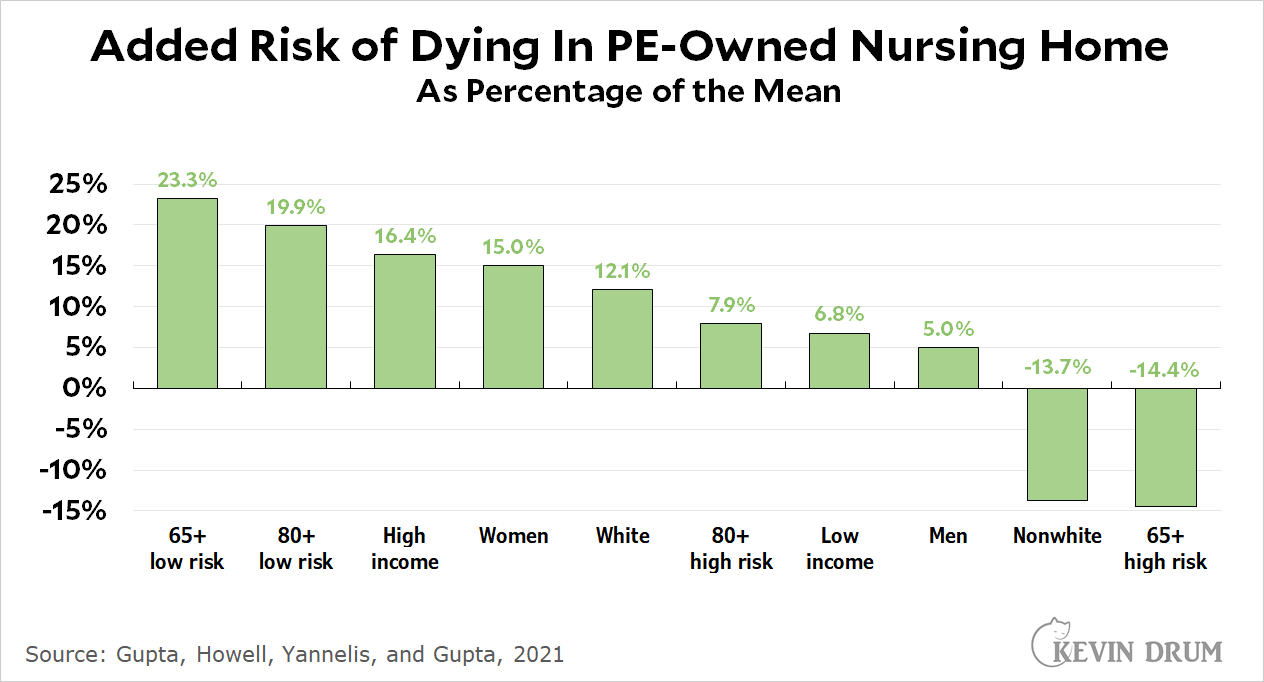A new NBER working paper concludes that when private equity firms buy nursing homes, they charge about 11% more and have 10% higher mortality rates—which clocks in at about 1,700 extra deaths per year. But that's just an average of all patients. The actual change in mortality depends a lot on who you are and why you're there:

The worst off are low-risk patients regardless of age, whose mortality rates increase by nearly a quarter. Surprisingly, nonwhite patients improve their mortality risk in PE-owned nursing homes. Also surprisingly, low-income patients have only a small increased risk compared to high-income patients.
I confess that these oddities, along with the fairly complex instrumenting used by the authors, makes me skittish about these results. Nevertheless, the overall result seems sound. After all, the only reason for private equity firms to be interested in nursing homes is if they think they can be run more profitably than before. This means charging more and reducing staffing levels—both of which they do—and this in turn is almost certain to produce higher mortality rates and lower patient well-being.
The only question left is: If I need to stay in a nursing home, how do I find out if it's owned by a private equity firm?

Hey! It's America. Wadda you expect?
You'd have to google the company, see if they're owned by a parent company which is controlled by a PE firm. Or see if you can find a non-profit home.
It's interesting that 65+ High Risk people seem to have a noticeably lower mortality rate in PE retirement homes, but 80+ High Risk people seem to have a higher one.
I think a much better question is how do we reduce corruption and increase regulatory oversight. The thing that makes this kind of Lemon Socialism work, like the scam with the Texas power grid, is a corrupt system that allows old people to die living in their shit while the perpetrators enjoy impunity with and shift the costs to the society at large. If there was an established minimum level of care and these vultures knew they’d be held accountable, there deaths and the miserable conditions the residents must endure would quickly vanish.
From the research paper:
"We supplement the Pitchbook data in two ways. First, we conduct additional Internet searches that yielded a small number of PE deals not reported by Pitchbook. Second, we obtain a list of merger and acquisition deals from 2005 to 2016 from Levin Associates, a market intelligence firm that tracks the healthcare sector."
They referenced a decade-old GAO report -- https://bityl.co/5j12 -- which included a list of the largest ten PE nursing home acquisitions between 1998-2008. See page 20 in the PDF.
Other than that, there doesn't appear to be a public list. State/federal regulations required, perhaps? Short of that, you can always inquire nursing homes on their ownership.
Looks like private equity is delivering exactly what the left demands -- more equity!
Those already doing best off (the lower-risk, women, whites) get pushed downward; those doing worse-off get pushed upward.
Isn't this what "we" have been demanding from society for fifty+ years? And now we are upset when it's delivered to "us"?
Who on earth is demanding that people doing better do worse ?
IF it's not owned by a private equity firm yet--it might be by the time you enter.
They are treating nursing homes like they are treating trailer parks.
Seems like this ought to be more newsworthy.
"The only question left is: If I need to stay in a nursing home, how do I find out if it's owned by a private equity firm?"
https://www.medicare.gov/care-compare/?providerType=NursingHome&redirect=true
It won't actually tell you if it's owned by a private equity firm, but it will tell you whether it is for-profit or not-for-profit or government operated, and provides detailed information about staffing and other such matters.
"charging more and reducing staffing levels"...
... and paying lower salaries, which might be persuading people with other options to get other jobs, which maybe it's increasing minority staff numbers, which might explain why minority seniors do better.
No idea if any of this is true, but at least it's a possible mechanism...
I wonder if that's because they avoid taking high-risk patients?
Avoid anything owned by CommuniCare - even if/when the facility name hasn't been changed (possibly multiple times).
If possible, choose a facility in a state where there are adequate investigations - without advance notification!
Nursing homes do offload certain patients, refusing to take them back after hospitalization & not saving their beds.
Some such places rely on not just minority staff, but physicians, nurses (RNs & LPNs), & CNAs from the Caribbean or Africa. This may be a factor in better outcomes of minority patients- or maybe the food & care, poor as they can be, are still better or st least more consistent than their prior living conditions. And discrimination can work both ways, in my experience.
My completely theoretical thinking as to why non-whites are doing better in PE homes is that PE homes only pays lower wages and thus attracts more minorities who in turn actually listen to empathize with the minorities who stay there. Similarly to how good medical outcomes for black people increases drastically if the doctor is black.
I wonder if the 65+ high risk group is seeing improvements the same way that Disney World sees no deaths. They just call the death at the hospital.
Cannot recall when I saw this ...... but years ago, a study reported that nursing homes run by some sort of religiously-affiliated group (if not directly by a house of worship) had higher levels of satisfaction amongst families.
Normally, I am leery of religious institutions ..... yet this might be an outward sign that it is not run by a "Corporations are people, too!" entity.